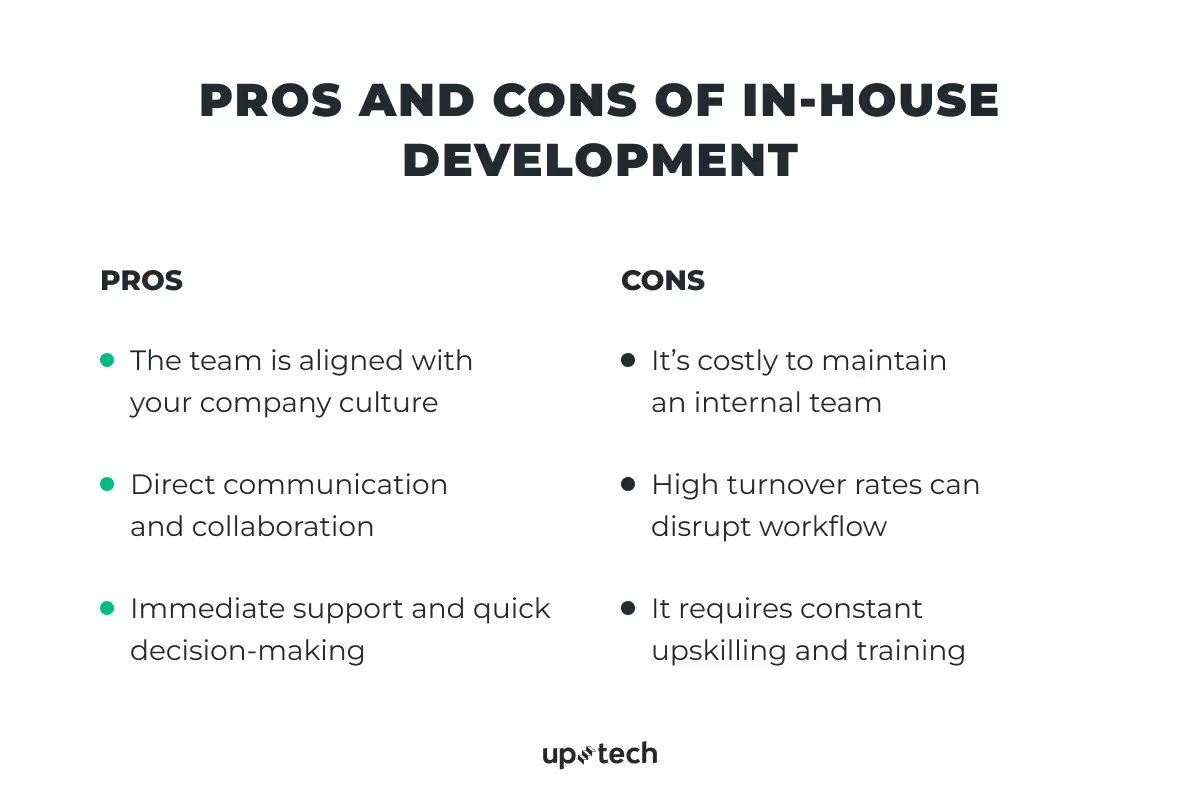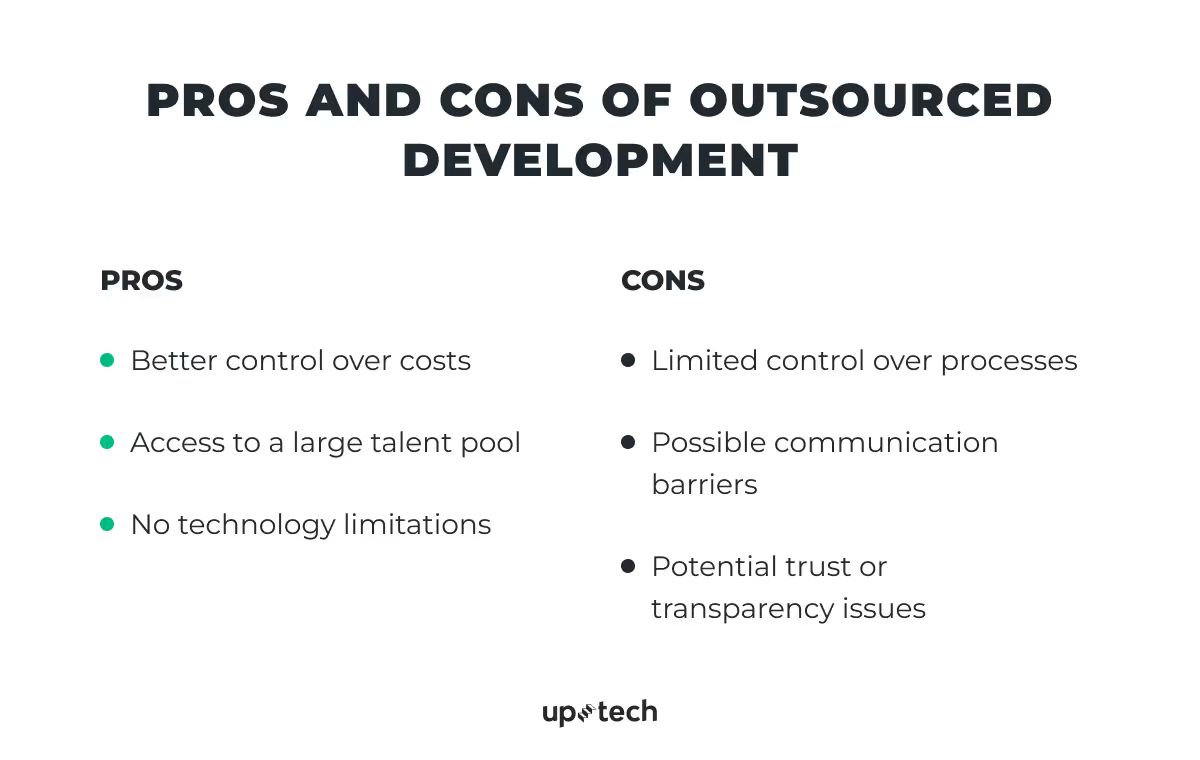So, you need a development team. But before you hire or sign any contracts, you face a key strategic choice: whether to build an in-house team or outsource the work.
Each model has its strengths. In-house teams offer control and focus, while outsourcing provides speed, specialized skills, and often, significant cost savings. The right choice will mostly depend on your company’s goals, timeline, and resources.
Ask yourself:
– Is this a long-term product or a short-term project?
– How fast do you need to scale?
– What’s your available budget and internal capacity?
Your answers will point you toward the better fit.
To help you decide, we’ll break down the core differences between in-house and outsourced development, compare their pros and cons, and show you which model delivers the most value in different situations.
Let’s start!
IT Outsourcing: Quick Statistics to Look At
The question that troubles almost every tech startup founder —“Should I choose in-house development or outsourced development?” — isn't an easy one, because there isn’t a definitive answer to it, despite the fact that the global IT outsourcing market is projected to grow to $1,219 billion by 2030.
It’s undeniable that more companies outsource their IT needs to countries like Ukraine, Poland, and Romania. The Deloitte Global Outsourcing Survey reports that 80% of executives plan to maintain or increase their investment in third-party outsourcing, which means that this business move meets expectations and business standards.
Cost-saving remains a top reason for outsourcing: about 59 % of companies outsource to cut costs. According to Outsource Accelerator, organizations that outsource IT operations reported overall cost savings of 21-55%, application-development budget savings of 11-21%, and infrastructure operational cost reduction of 16-48%.
Yet, the growth of the IT outsourcing industry and its advantages don’t automatically make it the right fit for every business. In some cases, building an in-house team might provide a stronger and more stable foundation. There are plenty of factors to weigh before making your decision.
Let’s take an objective look at both in-house and outsourcing models to get a clear understanding of what each can offer.

What is In-house Development?
In-house software development means building and managing your own team from the ground up. Team members are full-time employees who work exclusively for your company.
You hire and onboard specialists based on the skills and experience needed to develop your product. Many companies choose this model because it gives them complete control over the project, though it typically comes with higher costs and longer setup time.

Pros of in-house development
Choosing in-house development means investing in a team that grows within your company: not just technically, but culturally. You gain full control over how people work, communicate, and align with your long-term vision. Let’s look at what makes this model especially valuable.
Team that embodies your culture
Successful companies are driven by a high-spirited team that embodies the company’s core values. With in-house development, you have the opportunity to shape a group that fully embodies your company’s mission, tone, and way of thinking.
Every developer becomes part of your internal ecosystem that attends company meetings, understands the product vision, and shares responsibility for long-term success.
This deep alignment fosters smoother communication and faster decision-making since everyone speaks the same “business language” and understands the customer base and product direction.
Direct communication
It is a clear benefit of having an in-house team. An in-house team is exclusively dedicated to your company, and its members often work within a physical space.
When you’re developing a product, clarity and speed of communication can directly impact the bottom line. Requirements can shift mid-project, priorities can change, and customer feedback might require a quick feature pivot. With an in-house setup, those conversations happen in real time, not across time zones, not delayed by email threads or waiting for an available meeting slot.
Immediate support
One of the biggest operational advantages of in-house development is instant access to technical expertise when something goes wrong. Once your product goes live, bugs or unexpected issues are inevitable, especially in the early release stages. The developers who built the product are already on-site (or on Slack), ready to investigate the issue immediately.
This quick response time directly translates into lower downtime, faster recovery, and better user satisfaction, which is critical for customer-facing products or B2B platforms where every minute of service interruption costs money or reputation.
Cons of In-house development
While having an in-house team offers greater control and cultural alignment, it also comes with some challenges.
High and ongoing costs
Be prepared to pay for both the visible and hidden costs associated with hiring an in-house team. According to Payscale, the average salary of an IT developer in the US is $81,848. But that’s just the start — you’ll also need to factor in expenses like paid leave, health insurance, social security, recruitment, and onboarding. Even when your team isn’t actively working on a project, you’ll still be responsible for their fixed salaries and overhead costs.
For startups and small-to-mid-sized companies, this fixed-cost model can be risky. Unlike outsourcing, where costs scale with active work, in-house teams represent a permanent financial liability. Unless you have a steady flow of development projects and clear long-term goals, these expenses can weigh heavily on your operational budget.
High turnover risk
Getting the best talent for your company is hard, but keeping it is even harder. The tech industry is one of the most competitive labor markets in the world, with recruiters constantly approaching skilled engineers with better offers, remote flexibility, or equity packages. As a result, employee turnover in IT roles can reach 13–21% annually, depending on region and specialization.
From a business standpoint, high turnover leads to rising payroll costs, delivery disruptions, and recurring recruitment expenses. To retain key employees, companies often have to increase salaries and expand benefits. When senior developers leave, projects slow down and knowledge is lost, forcing managers to spend time and money on hiring and onboarding replacements.
Need for continuous upskilling
The IT industry undergoes constant change, with the introduction of new technologies, tools, and languages.
To stay ahead, companies must regularly invest in training programs, certifications, workshops, and updated tools, all of which come at a cost. Beyond direct expenses, there’s also the lost productivity while developers attend training or adapt to new technologies.
Over time, these investments, while necessary for innovation, can noticeably impact the company’s bottom line, especially for startups or small teams operating on limited budgets. You also need to manage the in-house team’s work, which adds another layer of responsibility and cost.
When to use in-house development?
Despite the seemingly high cost, there are sound reasons for building your in-house software development team.
- You don’t have a budget constraint. If you’re not running a bootstrapped startup and have plenty of capital at your disposal, hiring an in-house team will give you all the benefits and minimal cons.
- You need to be in full control. You can’t afford the risks of problems popping up, and you have no control over mitigation. With your own team, you make the calls on every decision that affects the product’s development. Any problems are addressed immediately.
- You value tight integration between business and tech. When your technical team works side-by-side with marketing, design, and operations, communication flows faster. This setup accelerates problem-solving and helps tailor features directly to customer feedback or business goals.
- You’re focused on long-term innovation. If your roadmap includes multiple product iterations, experimental features, or R&D-heavy work, an in-house team ensures continuity and domain depth. Developers who stay with the product for years understand the nuances of the system and can make smarter architectural decisions that pay off later.
Ultimately, in-house development makes the most sense when technology is the core engine of your business rather than a supporting function. If long-term control, product depth, and innovation outweigh short-term cost savings, building your own team isn’t just an operational choice — it’s a strategic investment in your company’s future.
Outsourcing Software Development: Pros and Cons?
Unlike in-house development, outsourced development involves delegating the product development process to an external vendor, typically through a contractual agreement. In this model, you communicate your requirements, timelines, and goals to the outsourcing partner, who then assembles a dedicated team to deliver the project.
Outsourced development is favored for its low cost and scalability, which makes it different from the in-house development approach. IT outsourcing has been an ever-growing trend, with the global market expected to generate approximately $618 billion in 2025.
Read this article to find out why companies outsource.
Despite many lingering fears and stereotypes around outsourced development, this model remains widely adopted — even by well-known global companies such as Google, Microsoft, and Apple, which continue to delegate parts of their IT, infrastructure, or customer support operations to external vendors.

Pros of Outsourcing
Outsourcing remains one of the most effective ways for startups and established businesses to scale efficiently. By delegating technical development to external experts, companies can focus on their core strategy while gaining flexibility, speed, and access to specialized talent.
Better control over cost
Outsourcing gives companies the flexibility to manage budgets more efficiently by accessing global talent at significantly lower rates. When operating in markets where local developers command premium salaries, partnering with vendors in regions such as Eastern Europe, Latin America, or Southeast Asia allows you to achieve comparable technical quality at a fraction of the cost. This cost advantage extends beyond salaries, since outsourcing firms handle recruitment, onboarding, and infrastructure, meaning you only pay for actual work delivered, not for idle time, benefits, or training.
From a business perspective, this translates into predictable costs, faster ROI, and reduced financial risk.
A large pool of talent
When you outsource, you’re no longer confined to a limited choice of candidates within your vicinity. Outsourcing gives businesses immediate access to a vast global network of highly skilled professionals. Instead of competing for the same limited pool of engineers in your region, you can tap into talent hubs across the globe.
You can assemble a complete, cross-functional team often within weeks, not months. For startups and enterprises under tight deadlines, this speed directly translates into faster product delivery and time-to-market.
No technology constraints
Different projects need different skills, and it’s hard to find people who are great at everything. With outsourcing, you don’t have to. You can work with IT companies that already have experts in the specific technologies your project requires.
This gives your business flexibility. Instead of training your in-house team or hiring new specialists for every new task, you can bring in the right people only when you need them. It helps you save time and use the best technologies available for your product.
Cons of Outsourced Development
Outsourcing can be an effective way to scale quickly and save costs, but it’s not without its trade-offs.
Limited control over the process
With outsourcing, the team doesn’t work exclusively on your project, so you naturally have less direct influence over day-to-day development. Still, this setup often comes with strong management structures: reputable vendors maintain clear communication channels, regular progress reports, and shared project dashboards to keep you in the loop.
While you may have less real-time control compared to an in-house team, you gain access to established workflows and dedicated project managers who help align priorities, resolve issues promptly, and ensure that feedback loops stay efficient — even across time zones. This approach lets you stay focused on outcomes rather than micromanagement, while the vendor takes care of execution details.
Communication barriers
If you’re outsourcing to an IT firm halfway across the world, it will be hard to schedule a meeting due to the time zone difference. Language differences could also be an issue. If the project manager or team lead struggles to fully grasp your business goals or feedback, even small miscommunications can lead to missed expectations.
To minimize this risk, companies need to establish clear communication rules, shared tools, and overlapping working hours. Still, compared to in-house collaboration, managing remote teams across continents requires more effort and structure to keep everyone aligned.
Trust and security concerns
When you outsource, you’re entrusting confidential information to a third-party vendor. You may be concerned about the agency’s privacy policy and whether it will also undertake projects from competitors in the future. Therefore, it’s important to vet the agency’s track record and sign an NDA to protect your interests legally.
Outsourcing can be safe and effective, but only when backed by due diligence and the right legal and security safeguards.
When to use outsourced development?
If you’re in any of the following situations, outsourcing development is the better option.
- Budget constraint. You’re operating on a tight budget and, like many startups, couldn’t afford a permanent team. Outsourcing gives you better flexibility in cash flow, and the commitment of monthly salaries does not tie you down.
- Lack of available talent. Somehow, you can’t find the right talent in your area. Rather than spending months on training one, you’ll be better off engaging an IT vendor to get the job done.
- Tight launch deadlines. If you have no prior experience in software development, you could be blindsided by common obstacles. When you have a deadline to meet, you can’t afford delays that can be averted if you engage an experienced IT vendor.
- Lack of clarity. It will be a big task to develop a complex IT solution even with an in-house team. There is a gap in turning business requirements into technical specifications. An outsourced vendor often has a business manager who can act as the intermediary between you and the developers.

In-house + Outsource: Get the best of both worlds
Choosing between in-house and outsourced development is challenging. However, you can seek the middle ground by combining both options.
You can retain a skeletal team to take care of the project’s core dependencies while outsourcing features that demand specific skills.
This hybrid model gives you the best of both worlds: access to a global talent pool, faster development, and reduced overhead costs, without losing visibility or ownership. It’s especially useful for startups and growing companies that need to move fast but can’t afford to expand their full-time staff too quickly.
Blending in-house expertise with external support lets you stay agile, scaling resources up or down based on your project’s needs while maintaining quality and strategic focus.
The key to blending in-house and outsourced development is to get the right partner. Here’s how to find a software partner.

Why is Uptech a Reliable Outsource Partner?
Uptech has 10 years of experience collaborating with remote partners across various industries. We have launched over 200 projects, like Goat or Dollar Shave Club.
Having built products within our own R&D teams, such as Plai and Sommo, we know firsthand what it takes to create solutions that align with real user needs and business objectives.
Our clients value us as their reliable and professional partner in software development outsourcing. According to their feedback, they value Uptech for our:
- Effective and transparent communication
- Strong commitment to quality delivery
- Fast-paced and efficient workflow
- Product mindset and Silicon Valley–level innovation
- Deep expertise in end-to-end product development
If you worry about the time zone difference, we have you covered. We have gained excellent skills that we perfected during the COVID-19 era while working with startups in different time zones. We’ve built a proven system of clear, on-time communication and flexible scheduling, always finding a convenient overlap for meetings and daily syncs.
We also rely on well-structured workflows and transparent information sharing through platforms like Notion, Jira, and Slack, ensuring that everyone stays aligned, regardless of location.
Conclusion
There is no answer to quell the debate of developing in-house vs. outsourcing. What may work for one company may not work for another one. The right choice depends on your goals, resources, and stage of growth. In many cases, a hybrid model, combining in-house expertise with external support, brings the best results.
At the end of the day, success comes down to choosing the right partner.
At Uptech, we’ve helped dozens of growing businesses take the weight of IT development off their shoulders.
Let’s talk and explore how outsourced development can help you build faster, smarter, and more efficiently. Contact us for a free consultation.












































































.avif)























